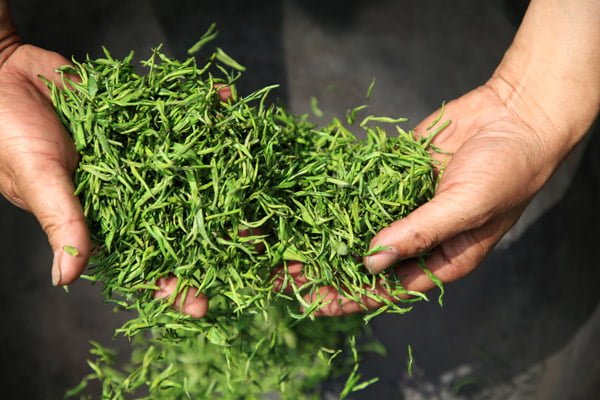In Southwest China’s Guizhou province, Mao Huayan and her husband, Kuang Zhengchao, are reaping the benefits of industrial development in their village of Jiaoyao. Through the trial planting of a tea garden in the 1980s, the village’s tea plantation area has now expanded to 251 hectares, with almost every family making a living from tea. Kuang and his wife have been able to earn an income of about 150,000 yuan last year, a figure that was once unimaginable to their parents.
The village’s success is due to the cooperative model, with the annual dividend of 1,097 yuan being the icing on the cake. Last year, Jiaoyao village’s cooperative allocated 40 percent of its profits to the shareholders. Mao states that while the dividend wasn’t much, everyone was happy, and it was the best reward for their year of hard work.
Kuang’s family used to have trouble putting food on the table due to poor agricultural production conditions. But with the success of the tea industry, he now earns 70,000 yuan a year just from selling tea. In 2019, Kuang and seven other young people in the village set up a tea cooperative, integrating the resources of the tea industry and implementing a model of unified planting, fertilization, processing, and sales to achieve high quality and a good flavor.
Mao and her husband plan to broaden the sales channels for their products through short videos and live streams to earn a more substantial income. The tea business has made their life better, and even during the quiet season, Kuang comes to a room in the tea garden on top of the mountain to make guqin, a seven-stringed zither. By selling tea, he got acquainted with a guqin maker and learned the craft himself. Through trial and error, he now makes more than 70 of the traditional instruments a year and earns about 50,000 yuan.
Mao and her husband’s success story is a testament to the power of industrial development and the cooperative model. With the village’s success in the tea industry, the once-poor Jiaoyao village has become a wealthy one, and its residents are reaping the benefits.
Jiaoyao village in China’s Guizhou province has undergone a remarkable transformation thanks to the tea industry. Mao Huayan, a resident of the village, was delighted to receive her bonus of 1,097 yuan ($162.8), which was the annual dividend of the village’s cooperative. The cooperative allocated 40% of its profits to the shareholders in the village, providing a welcome reward for their hard work. Mao was also grateful for the industrial development that enabled her and her husband to earn 150,000 yuan last year, a significant increase from their parents’ income. The tea industry in Jiaoyao village began with a trial planting of a 6-mu tea garden in the 1980s. The village’s tea plantation area has now expanded to 251 hectares, with almost every family in the village making a living from tea. Forty-five villagers have established several tea processing plants and cooperatives, significantly improving their income and transforming the once-poor village into a wealthy one. Mao’s husband, Kuang Zhengchao, who grew up in Jiaoyao village, used to struggle to provide food for his family. However, he now earns 70,000 yuan a year just from selling tea. In 2019, Kuang and seven other young people set up a tea cooperative with the support of the village’s economic cooperative. The cooperative integrated the resources of the tea industry and implemented the model of unified planting, fertilization, processing, and sales, aiming to achieve high quality and a good flavor. An old house in the village was converted into a tea processing and exhibition workshop, and the house facing the mountains and tea garden was turned into a separate tea tasting room. Kuang, who learned to make guqin by selling tea, now makes over 70 traditional instruments a year and earns about 50,000 yuan. Mao plans to broaden the sales channels for their products through short videos and live streams, hoping to achieve a more substantial income. Furthermore, Mao’s baby will be born in the Year of the Rabbit, leading the couple to believe that the harvest will be bountiful this year.
